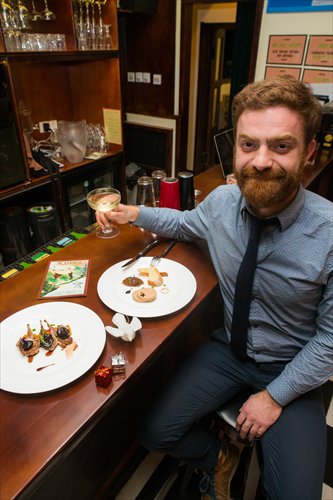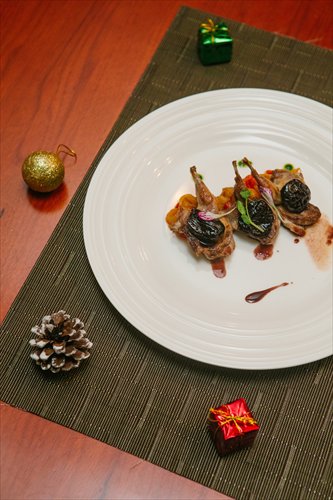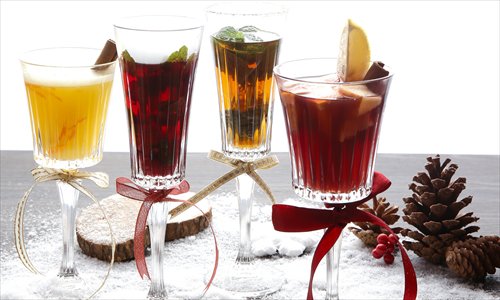Eastern twist to holiday dishes
Traditional Christmas dishes take on Chinese characteristics
Michelle Zheng, a 27-year-old who works in a foreign consulting company in Beijing, is planning a Christmas dinner with her local and foreign friends. Every year, she spends an entire day preparing a fusion of Chinese and Western meals.
Three years ago, she returned to Beijing after studying overseas in the UK. While abroad, she would spend Christmas at the homes of her foreign friends and their families, which left her with many good memories.
"After returning to China, I kept the tradition [of spending Christmas eating a home-cooked meal]. But I now have a mixed menu so that both my Chinese and foreign friends can enjoy it. For example, I use fried turkey or chicken instead of roast turkey, which is very popular with them."
Like Zheng, more and more people are trying a different style of Christmas dinner by getting inspiration from Chinese cuisine in ingredients and cooking methods at their home or in restaurants.
A November 5 report by The Event Magazine, based in the UK, highlighted six catering trends for the festive season this year. One is Asian influence. The fact that cuisines from Asian countries, such as China, are trending on the restaurant scene this year is likely to influence 2015's Christmas party menus.
"Spicy and warming, these dishes are perfect for alternative festive parties and the winter months," a London-based independent event caterer was quoted as saying in the report.

Matthieu Torrano, manager of Modernista Restaurant, showcases elements of his Asian fusion Christmas menu on Tuesday. Torrano and executive chef Wei Yuanke designed a special menu with Chinese flavors for this year's Christmas. Photo: Li Hao/GT
Home-style combination
Zheng recalls that in London during Christmas, she would have a very traditional Christmas dinner, with egg nog, roast turkey, ham, steak, lamb and many different kinds of desserts. A usual menu would be foie gras with bread, red or white wine and salad as a starter. The main dishes would be roast turkey with many different fixings and steak with some side dishes. To top it off would be a homemade tree-shaped cake, she said.
"With a lot of people around the table, Christmas carols and the exciting feeling of getting a mysterious present, it is quite a warm atmosphere," Zheng said.
After returning to China, Zheng designed a special home-style Christmas menu and enjoyed it with her friends.
Last year, she baked chestnut pastries with pork filling as the canapé, a bit like Chinese mooncakes. "Turkey or goose is one of the main courses on Christmas menu. But some of my friends do not like roast turkey, so I tried using a Chinese cooking style to make it as crisp as fried chicken. I also prepared a duck with some Western-style side dishes."
Zheng also tried Christmas desserts made by one of her foreign friends who used some Chinese or Asian ingredients, such as tea leaves and durian fruit to make tree-shaped cakes.
Fu Yang, a creative food designer who has designed special Christmas menus for Chinese celebrities and Westerners, said that recent years have seen a trend of fusing Yuletide dinners with Chinese flavors. This trend is gaining more popularity among both Chinese young people and foreigners, who like mixed tastes or traditions.
Fu gave as an example one year's Christmas menu for Christy Chung, an actress from Hong Kong.
For a catered dinner at her home, he included some dishes such as green pepper fried with bamboo clam, and Beijing-style noodles with soybean paste, as alternatives to mashed potatoes or other Western sides. They were very popular, he said.

Stewed and roasted quail with confit prune sauce and roasted bell peppers, one of the side dishes on Modernista's Christmas menu. Photo: Li Hao/GT
Restaurants testing water
Anna Fyrinidou, a 34-year-old who has been in Beijing for five years, also likes to try different Christmas food because of her multicultural background. She is a Greek from Germany working in China for a Cypriot company.
Every year, Fyrinidou spends Christmas in Beijing. She found that some Western-style restaurants tend to make their Christmas dishes less authentic.
"They like to make dishes more tasty for Chinese customers," she said.
For example, some restaurants fry chicken rather than roasting it, use duck as the main course rather than turkey or goose, make some of the cuisine more spicy, add some Chinese dishes to the menu, and use some traditional Chinese cooking methods such as bruising to make the Western-style cuisine, she said.
Matthieu Torrano, manager of Modernista Restaurant, a Western-style bistro in Dongcheng district, told Metropolitan that adding Chinese elements to his Christmas menu just made good business sense. A Frenchman who has been in living in Beijing for nine years, Torrano said roughly 60 percent of his clients are Chinese, and that as more of them celebrate Christmas, they tend to gravitate toward fusion Christmas dishes. Also, sometimes using Chinese ingredients just made for a better menu. For example, he said, "Mango and purple sweet potato are very common in China, so we made some innovations by preparing goose liver served with mango chutney for the Christmas menu, which I never tried before in Europe."
Wei Yuanke, executive chief of the restaurant, said, "Apples and chestnuts are also very common in China in the winter, so we use them as ingredients. For example, we make chestnut soup out of chestnut, apples and apple beer."
Wei said the restaurant also paired Chinese fried shredded potatoes and oranges with haddock to create a tasty fusion meal.
Katie Li, co-founder of TIAGO Home Kitchen in Chaoyang district, also pointed out that besides food, drinks are a very important part of Christmas dinner.
As an Australian-born Chinese, Li was very impressed with traditional Christmas in Australia. Though there is no snow and it is not very cold there, different drinks like fruit wine, egg nog and hot mulled wine gave her a strong festive feeling, she said.
Even after she came to China, every year she would make herself mulled wine with some Chinese herbs like wolfberry, cinnamon and honey. "We originally wanted to bring the original, traditional mulled wine to customers, but some Chinese customers find that it is a bit strong in taste, so we made some changes by reducing the cinnamon and adding other Chinese traditional ingredients and herbs such as anise, brown sugar and ginger," said Li.

Mulled wine from TIAGO Home Kitchen, specially tailored to the Chinese palate. Photo: Courtesy of TIAGO Home Kitchen
How to choose your own Christmas menu?
Though the fusion of Christmas dishes with Chinese flavors is rapidly gaining popularity, Fyrinidou thinks that the trend fills a niche that will never become mainstream because there are still a lot of people who want to have traditional Christmas dishes.
For a home-style feast, she would prepare stuffed turkey with different kinds of fillings to symbolize having a "rich" Christmas, Greek melomakarona (a honey cookie), kourambiedes (a Greek cookie), German Christmas plaetzchen (a German cookie) and stollen, which are common traditional sweets.
Many people tend to stick to their traditions, whether it is with a turkey, chicken, or Christmas ham, for example, and it also depends on their nationality. Expats who feel homesick and could not go home to spend Christmas with their families, prefer to have traditional dishes that have not been much influenced by Chinese flavors, she said.
But for those who want to have a innovative twist to tradition, she advised going online and finding recipes of different styles of Christmas dinner and experimenting with them.
"Those without an oven can have a try at fried duck or chicken or making stuffed chicken with some Chinese ingredients like glutinous rice, which is quite delicious," said Zheng.
"The Christmas atmosphere in Beijing is wonderful and everybody is making a lot of effort to make the city and especially their own places warm and attractive, giving a special Christmas-feeling," said Fyrinidou. "But no matter how beautiful the city is, or how many events there are, it is still a decoration because being with loved ones is the most important thing at Christmas. Luckily, I have food and local Chinese friends who can give me warmth and comfort."
Fusion Christmas recipes
Crisp fried chicken
Ingredients: salt, chicken, pepper, cooking wine, onion, rapeseed oil
Chicken batter: sugar, apple vinegar, brandy, sesame oil, corn starch
Spread the salt, cooking wine and pepper on the whole chicken. Then wrap it with plastic wrap and put it in the fridge. On the next day, put ginger and onion inside the chicken and steam it in a steamer for one hour and 20 minutes. Remove it from the steamer and let it sit for at least three hours. Spread the batter on the chicken and fry it in oil at medium temperature.
Mulled wine
Ingredients: red wine, brown sugar, cinnamon, orange, honey, apple, lemon, star anise, cloves
Chop the lemon into cubes. Put all the ingredients into a saucepan and heat it over a low flame for 20 minutes. Pour it into a mug, add honey, stir and enjoy.
Note: You can reduce the amount of herbs and spices to suit your taste.
Source: Michelle Zheng & Katie Li